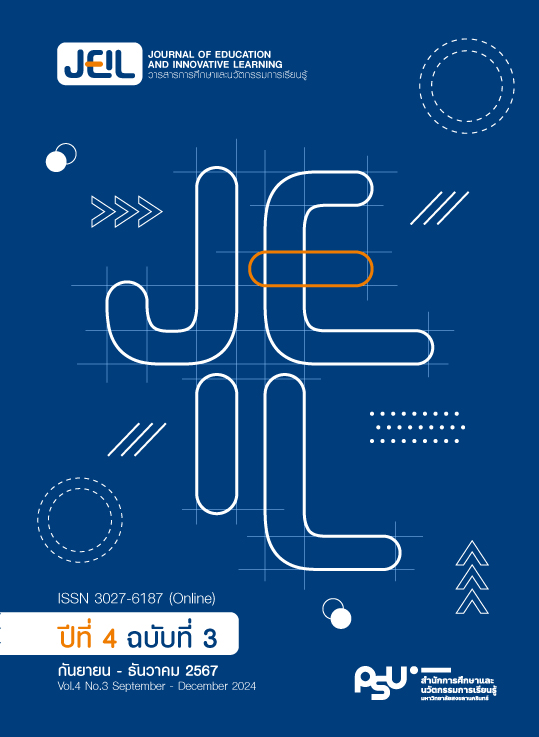Learning in and Acceptance of Using Work-Integrated Learning by Students in “Policy Implementation and Evaluation” Subject
Main Article Content
Abstract
This research focused to study 1) the student learning and 2) the level of students' opinions towards using work-integrated learning in “policy implementation and evaluation” subject. The study employed a mixed method. The sample consisted of 32 third-year students from the Public Administration Program, Faculty of Commerce and Management, Prince of Songkla University, Trang Campus, who enrolled in the “policy implementation and evaluation” subject in the first semester of the academic year 2022. The researchers collected data by in-depth interviews, observations during activities, and questionnaires. The results revealed that 1) students could achieve multiple learning outcomes in social domain, cognitive domain, affective domain, and psychomotor domain; and 2) the students had a high level of overall opinion (x̄=4.62, S.D.=0.42), while the issue of encouraging learners to work with others had the highest average score (x̄=4.79, S.D.=0.42), and the issue of assisting learners in reasoning got the least average score (x̄=4.47, S.D.=0.51).
Article Details

This work is licensed under a Creative Commons Attribution-NonCommercial-NoDerivatives 4.0 International License.
The contents and data in published articles in the Journal of Education and Innovative Learning are considered the ideas and responsibility of the author(s). The Editorial team does not necessarily agree with any ideas or hold mutual responsibility of them. Plagiarism is not permitted, even for academic purposes. However, proper citation must be given whenever referencing the articles.
References
Anderson, L. W., Krathwohl, D. R., Airasian, P. W., Cruikshank, K. A., Mayer, R., Pintrich, P. R., Raths, J. D., & Wittrock, M. C. (2001). A taxonomy for learning, teaching, and assessing: A revision of Bloom's taxonomy of educational objectives. New York: Longman.
Asawapoom, S. (2018). Thai education 4.0: New concept and trends of Thai education provision. Journal of Ratchathani Innovative Social Sciences, 1(1), 1-11. Retrieved from https://so03.tci-thaijo.org/index.php/JRISS/article/view/133807 [in Thai]
Ball, S. J. (1998). Big policies/small world: An introduction to international perspectives in education policy. Comparative Education, 34(2), 119-130. doi:10.1080/03050069828225
Bartosh, O., Danko, D., Kanyuk, O., Hodovanets, N., & Myhalyna, Z. (2023). Based learning in the education process of a higher education institution. Revista Amazonia Investiga, 12(64), 208-216. doi:10.34069/AI/2023.64.04.20
Bloom, B. S. (Ed.), Engelhart, M. D., Furst, E. J., Hill, W. H., & Krathwohl, D. R. (1956). Taxonomy of educational objectives, handbook I: The cognitive domain. New York: David McKay.
Dye, T. (2016). Understanding public policy (15th ed.). New York: Pearson.
Jackson, D., & Rowe, A. (2023). Impact of work-integrated learning and co-curricular activities on graduate labour force outcomes. Studies in Higher Education, 48(3), 490-506. doi:10.1080/03075079.2022.2145465
Khumraksa, B., & Rakbamrung, P. (2022). Effect of research–based learning: Science student teacher’s opinions on their learning outcomes according to the Thai higher education qualifications framework and environmental science learning achievement. Journal of Research Unit on Science, Technology and Environment for Learning, 13(1), 125-141. Retrieved from https://ejournals.swu.ac.th/index.php/JSTEL/article/view/13098 [in Thai]
Krathwohl, D. R. (2002). A revision of Bloom's taxonomy: An overview. Theory Into Practice, 41(4), 212-218.
Mabungela, M., & Mtiki, V. (2024). Accelerating graduate employability through work-integrated learning. Research in Social Sciences and Technology, 9(1), 291-304. Retrieved from http://www.jstor.org/stable/1477405.
Malawai, N., Choochom, O., & Peungposop, N. (2022). Student teamwork: Causal factors, suggestions for research. Journal of Roi Kaensarn Academi, 7(3), 425-438. Retrieved from https://so02.tci-thaijo.org/index.php/JRKSA/article/view/252945 [in Thai]
Ministry of Higher Education, Science, Research and Innovation. (2022). U2T for BCG project. Retrieved from https://www.bcg.in.th/news/what-is-u2t-for-bcg [in Thai]
National Statistical Office. (2021). Definition of higher education. Retrieved from https://statstd.nso.go.th/definition/projectdetail.aspx?periodId=47&defprodefId=569 [in Thai]
Office of National Higher Education Science Research and Innovation Policy Council. (2022). Sustainable development goals–SDGs. Retrieved from https://www.nxpo.or.th/th/8081 [in Thai]
Prachyapruit, A. (2017). Development of teacher preparation model to serve education 4.0. Romphruek Journal, 35(3), 101-136. Retrieved from https://so05.tci-thaijo.org/index.php/romphruekj/article/view/117141 [in Thai]
Professional and Organizational Development Network of Thailand Higher Education. (2022). Research-based learning. Retrieved from https://active-learning.thailandpod.org/learning-activities/research-based-learning [in Thai]
Sinthuchai, S., Ubolwan, K., & Panidchakul, K. (2020). Team-based learning: Implementing in learning and teaching. Journal of Health and Nursing Research, 36(3), 273-283. Retrieved from https://he01.tci-thaijo.org/index.php/bcnbangkok/article/view/247010 [in Thai]
Smith, C., Ferns, S., & Russell, L. (2014). The impact of work-integrated learning on student work-readiness. The Office for Learning and Teaching.
Taneerat, W. (2021). Effectiveness of work-integrated learning model: Case study on project formulation and policy analysis course. Journal of Education and Innovative Learning, 1(2), 141-156. Retrieved from https://so06.tci-thaijo.org/index.php/jeil/article/view/248826 [in Thai]
United Nations. (2022). Sustainable development goals (SDGs). Retrieved from https://sdgs.un.org/goals.
Wessels, I., Rueß, J., Gess, C., Deicke, W., & Ziegler, M. (2021). Is research-based learning effective? Evidence from a pre–post analysis in the social sciences. Studies in Higher Education, 46(12), 2595-2609. doi:10.1080/03075079.2020.1739014
Yamnun, S. (2004). Cooperative education: Educational management model for economic security. Bangkok: National Defence College. [in Thai]
Yawai, A., & Vongchavalitkul, N. (2019). Development of learning outcomes by creating a learning environment based on working in real conditions. Journal of Education Studies, 47(Suppl.2), 407-427. Retrieved from https://so02.tci-thaijo.org/index.php/EDUCU/article/view/232664 [in Thai]


